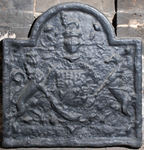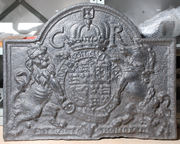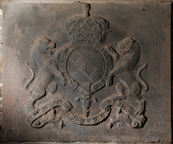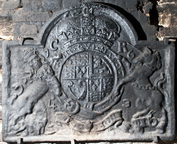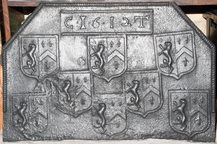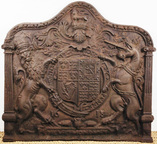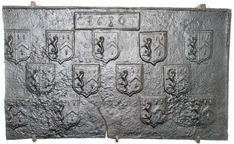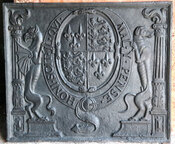-
794
Description: Arched rectangular shape; probable ovolo-moulded edging; Stuart royal arms of England (quarterly, 1st and 4th, France and England, 2nd Scotland and 3rd Ireland) with garter, crown, crest, motto and supporters.
Notes: A poor recasting, obscuring most of the detail.
Copies of this fireback are known.
Inscription: [illegible]
Arms: English Stuart royal
- Decoration tags:
- rectangular with round arch (shape)
- ovolo (edging)
- whole carved pattern
- armorial
- royal
Manufactured: in the 17th century in England.
Current location: Wickham Manor Farm, Winchelsea, East Sussex, England.
Museum number: NT/WMF/M/031 (part of the National Trust museum group)
- Attached to series:
- Stuart royal armorial firebacks
-
795
Description: Arched rectangular shape; cavetto-moulded edging; English royal Stuart shield, garter, crown, supporters and motto; initials split by crown.
Notes: The arches of the crown are not typically English in form, suggesting a possibly continental pattern-maker.
Inscription: C R / HONI SOIT QVI MAL ...PEN...
Arms: English Stuart royal
- Decoration tags:
- rectangular with round arch (shape)
- cavetto (edging)
- whole carved pattern
- armorial
- royal
- text
Manufactured: in the 17th century possibly in the Weald area of England.
Current location: Winchester Museums Store, Unit F2, Bar End Industrial Estate, Winchester, Hampshire, Winchester, Hampshire, England.
Museum number: WINCM:LH 3737 (part of the Winchester Museums museum group)
-
962
Description: Arched rectangular shape; ovolo moulded edging; Tudor royal shield, garter, crown, motto and supporters (crowned lion and dragon); plain panels at sides and bottom.
Notes: A common variant has a rose and portcullis either side of the crown, and the top of the lion's crown and the dragon's ear do not overlap the edging; without the extension panels, the approximate dimensions of the main plate are 805mm wide by 590 high. The quality of the relief indicates that this composite fireback was created using an early casting of the armorial back.
Inscription: [Garter] HONI SOIT QVI MAL E PENSE / [motto] DIEV ET MON DROIT
Arms: Tudor royal
- Decoration tags:
- rectangular with round arch (shape)
- rope and wood moulding (edging)
- whole carved pattern
- composite
- planklines
- extension panels
- armorial
Manufactured: in the mid- to late-16th century in the Weald area of England.
Current location: in private hands, Wisborough Green, West Sussex, England.
-
799
Description: Rectangular; plain plate with shield, supporters, ducal coronet, motto and garter of the Duke of Dorset: Quarterly, Or and gules, a bend vair.
Notes: Almost certainly the arms of Lionel Sackville KG (1688-1765), created first duke of Dorset in 1720; many different firebacks exist, all with precisely the same armorial stamp.
Copies of this fireback are known.
Inscription: [around shield] HONY SOIT QUI MAL Y PENSE / [on motto scroll] AUT NUNQUAM TENTES, AUT PERFICE
Arms: Lionel Sackville, 1st Duke of Dorset
- Decoration tags:
- rectangular (shape)
- none (edging)
- carved stamps
- armorial
- text
Manufactured: in the early-18th century in the Weald area of England.
Current location: in private hands, Withyham, East Sussex, England.
- Attached to series:
- Dorset arms series
- Sackville firebacks
- Personal armorial firebacks
-
800
Description: Rectangular; plain plate with shield, supporters, ducal coronet, motto and garter of the Duke of Dorset: Quarterly, Or and gules, a bend vair.
Notes: Almost certainly the arms of Lionel Sackville KG (1688-1765), created first duke of Dorset in 1720; many different firebacks exist, all with precisely the same armorial stamp.
Inscription: HONI SOIT QUI MAL Y PENSE / AUT NUNQUAM TENTES, AUT PERFICE [Either do not attempt, or complete]
Arms: Lionel Sackville, 1st Duke of Dorset
- Decoration tags:
- rectangular (shape)
- none (edging)
- carved stamps
- armorial
- text
Manufactured: in the early-18th century in the Weald area of England.
Current location: in private hands, Withyham, East Sussex, England.
- Attached to series:
- Dorset arms series
- Sackville firebacks
- Personal armorial firebacks
-
1303
Description: Arched rectangular shape; cavetto edging; armorial; Stuart English royal arms within a circular garter; crown, motto and supporters (crowned lion and unicorn); initials separated by cro wn; date - 1643 - inserted outside Garter.
Notes: A widely copied fireback with the date, 1643, probably spurious, inserted when copied. An earlier casting without the date is no. 350.
Inscription: C R / 1 6 / HONI SOIT QVI MAL Y PENSE / 4 3 / DIEU ET MON DROIT
Arms: English Stuart royal
- Decoration tags:
- rectangular with round arch (shape)
- cavetto (edging)
- whole carved pattern
- individual numbers
- heraldic
- armorial
- royal
- text
Manufactured: in the mid-17th century in England.
Current location: in private hands, Worth, West Sussex, England.
- Attached to series:
- Carolean royal armorial firebacks
- Stuart royal armorial firebacks
-
1192
Description: Canted rectangular shape; twisted rope edging formed of six lengths of 23cm (top and sides); top centre, rectangular panel with cavetto-moulded edging (left side missing) enclosing date between initials CT, all interposed with dots; below, eight shields of Ayloffe impaling Sulyard in three rows (3-2-3); Ayloffe: sable, a lion rampant Or, collared gules, between three crosses formy of the second; Sulyard: argent, a chevron gules between three pheons inverted sable.
Notes: William Ayloffe (c1535-1584) of Bretons, Hornchurch, Essex, Justice of the Court of Queen’s Bench, married (c1560) Jane, dau. of Sir Eustace Sulyard, of Runwell, Essex. The initials 'CT' are likely to be those of Charles Tyler, a founder whose working life and that of his family have strong parallels with the occurrence of these firebacks. The excrescence affecting the left shield in the middle row and the blemish left of the middle shield in the top row are the result of inexpert ladling of the iron during casting. Previously at Smarden, Kent.
Inscription: C.1.6.1.2.T
Arms: Ayloffe impaling Sulyard (William Ayloffe of Bretons, Hornchurch)
- Decoration tags:
- rectangular with canted top corners (shape)
- rope (edging)
- carved stamps
- individual letters
- individual numbers
- heraldic
- armorial
- text
Manufactured: in 1612 possibly at Bedgebury Furnace, Goudhurst in the Weald area of England.
Current location: in private hands, Crawley, West Sussex, England.
- Attached to series:
- Ayloffe series
- Personal armorial firebacks
-
254
Description: Curved ogee-arched rectangular with egg and dart moulding along top, supported by Ionic pilasters; English Stuart royal shield, garter, helm, crown, motto and supporters; date below and either side of garter.
Notes: One of several firebacks, all of the same date, but varying in size, framing style and moulding; all have stylistic features in common and will have been the work of the same pattern maker, who was also responsible for carving royal coats of arms in three West Country churches. A casting of this design serves as a royal armorial in St Lawrence's church, Bigbury, Devon.
Copies of this fireback are known.
Inscription: HONI + SOIT + QVI + MAL + Y + PENSE / 16 18
Arms: English Stuart royal (James I)
- Decoration tags:
- rectangular with round arch (shape)
- complex individual (edging)
- whole carved pattern
- planklines
- armorial
- royal
- text
Manufactured: in 1618 possibly in the Forest of Dean area of England.
Current location: not known.
-
1008
Description: Rectangular; twisted rope edging on top and (probably both) sides; cavetto-moulded-edged rectangle top centre, enclosing date between initials; 13 shields of Ayloffe impaling Sulyard in three rows (5-4-4), the bottom row having a gap between the middle pair of shields; Ayloffe: sable, a lion rampant Or, collared gules, between three crosses formy of the second; Sulyard: argent, a chevron gules between three pheons inverted sable.
Notes: William Ayloffe (c1535-1584) of Bretons, Hornchurch, Essex, Justice of the Court of Queen’s Bench, married (c1560) Jane, dau. of Sir Eustace Sulyard, of Runwell, Essex. About 110mm of the left side has broken off suggesting an original width of 1340mm. The initials 'CT' are likely to be those of Charles Tyler, a founder whose working life and that of his family have strong parallels with the occurrence of these firebacks.
Inscription: C 1610 T
Arms: Ayloffe impaling Sulyard (William Ayloffe of Bretons, Hornchurch)
- Decoration tags:
- rectangular (shape)
- rope (edging)
- carved stamps
- individual letters
- individual numbers
- armorial
- text
Manufactured: in 1610 possibly at Bedgebury Furnace, Goudhurst in the Weald area of England.
Current location: Wye College, High Street, Wye, Kent, England.
- Attached to series:
- Ayloffe series
- Personal armorial firebacks
-
1010
Description: Rectangular with ovolo-moulded edging; central oval shield of England (quarterly France modern and England) surrounded by the Garter with the additional word 'IL', and supported by a dragon on the dexter side and a greyhound on the sinister side, each standing on a plinth; to each side of the armorial group is a column with the upper part of the shaft fluted and the lower part foliate; each has an Ionic capital and a moulded pedestal; fire issues from the top of the capital.
Notes: The style of carving is not typical of English design but is similar to other firebacks bearing Tudor armorials that were probably cast in Wallonia.
Inscription: HONI SOIT IL QVI MAL Y PENSE
Arms: English royal Tudor (prob. Henry VIII)
- Decoration tags:
- rectangular (shape)
- ovolo (edging)
- whole carved pattern
- armorial
- royal
Manufactured: in the 17th century possibly in the Wallonia area of Belgium.
Current location: Westpreussenring 1, Saarbrucken, Saarland, Germany.
Citation: Carpentier, H., 1912, Plaques de Cheminées (Paris, published by the author).
- Attached to series:
- Tudor royal armorial firebacks
- Continental Tudor royal armorial firebacks
